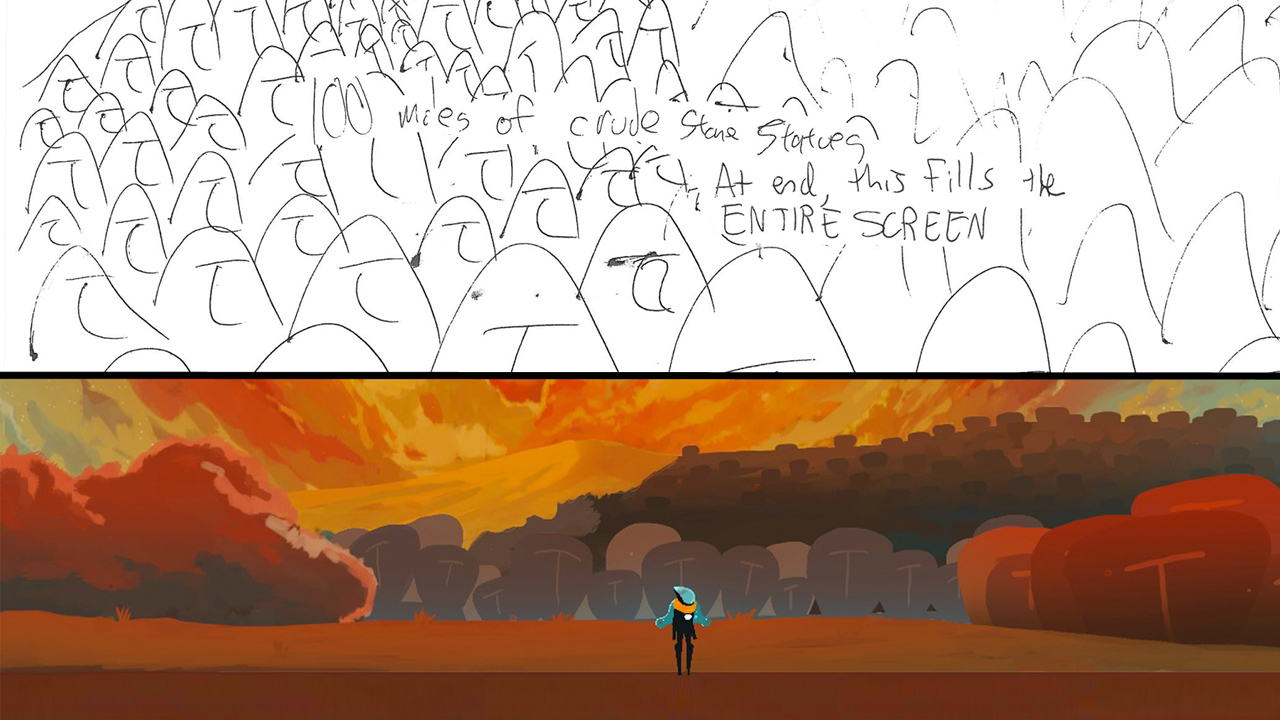ANIMAL’s feature Game Plan asks video game developers to share a bit about their process and some working images from the creation of a recent game. This week, we spoke with Ziba Scott of Popcannibal about Elegy for a Dead World, a game in which players concoct their own stories about long-gone civilizations.
Ziba Scott’s favorite definition of video games and the people who play them comes from Eric Zimmerman and Katie Salen’s book on game design, “Rules of Play” — “someone who’s willing to overcome an unnecessary obstacle.” In Elegy for a Dead World, that obstacle is writer’s block.

“Writing is a challenge,” Scott told ANIMAL. “Complete that challenge until you feel happy with it. There: it’s a game.”
In Elegy players walk from left to right, detouring only to explore the odd building, across the surfaces of deserted planets. The great civilizations that once inhabited these landscapes are long dead, and only their ruins remain. But there are no treasures to find or ghosts to fight in Elegy; instead, players simply try to determine what happened to the alien peoples whose detritus litters their abandoned homes.

Monuments lie broken, their pieces strewn across the ground. Nature encroaches on once-towering skyscrapers now crawling with vines. Who lived here? How did this happen? What did they lose? Developers Dejobaan Games and Popcannibal set the mood with beautiful visuals and haunting music, and you’re left to determine for yourself what you think occurred. You write your own histories in Elegy—literally.

You choose one of three play styles when you select a planet to explore: the game can help you write either a poem or a story, or you can write freeform. Choosing one of the first two options triggers prompts to appear within the level—things like “Fifty thousand years ago, long before ___, this land was home to a great people,” where you fill in the blank. As the story progresses the prompts contain fewer words and more blanks, giving your imagination room to take over. And of course there’s always the third option, where you insert whatever words you want anywhere in each level. How these stories take shape is ultimately up to you.

“There’s a million little things in every game. I don’t have to navigate this menu; I could walk away and go eat a sandwich. I choose to do this. But the big things — for Mega Man, it’s ‘I’m going to memorize these moves and beat this boss.’ For Elegy, it’s ‘I am going to think hard about this world and create something I’m proud of,'” Scott said. “I think that’s a novel, valuable thing.”

Elegy began life in August 2013 as a week-long game “jam” that would have been completed in five days or less. The initial pitch was “something very simple, walking from left to right, reading things,” according to Scott. But by the end of the week the handful of developers working on the game had an “epiphany,” that “this should be less about reading and more about writing.” They knew then that Elegy would be more than a work-week-long project, and it was months later still that they added writing prompts, cementing Elegy’s “gameplay,” such as it is.
Before that epiphany, when Elegy was going to be about reading stories rather than writing them, Scott and his cohorts designed a very specific narrative inspired by British romantic poets like William Blake and John Keats. “We wanted to tell those stories—in landscape,” Scott said. During the first days of development—as can be seen in some of the early sketches Scott sent to ANIMAL—they planned to spell these poems out “very clearly and very specifically.”

“We were going to give you all these objects you could read and inspect, tell you exactly how we interpreted these stories in these alien landscapes,” Scott said. “The attitude, the feeling, what these poems evoke was so inspiring to us…these poems are all about endings, end-times, the ends of lives, the ends of worlds, the ends of situations. They’re very isolating, or about isolation. And they’re about man’s struggle to find his place in nature.”

Letting players have their way with those themes was eye-opening. Initially many didn’t take it seriously, and there will always be those who default to dick jokes. But as the game’s art, music and writing prompts have improved, players’ responses have become more and more serious. “So much of it’s mood,” Scott said. Each planet is designed to tell a story, and it’s up to players to interpret what that story is, for better or worse.
“I think I’m learning a lesson through this whole process about giving people blanks to fill in—giving people some leeway to do their own stuff. That me spelling things out exactly in everything isn’t always the best,” Scott said. “When the movie ends, don’t actually say whether the main character lived or died, just let the person wonder about that for a while, because they want to.” And in the case of Elegy, let them write the ending for themselves.

Elegy for a Dead World is in development now for Windows, Mac and Linux PCs. The developers hope to have it done by the fall, but make no promises. Learn more at Dejobaan.com/elegy.


